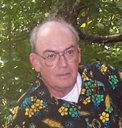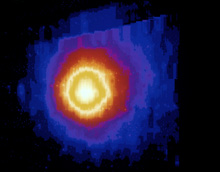Alright, it isn't a Trcorder yet, but a beginning just the same.
http://en.wikipedia.org/wiki/Tricorder
- LRK -
_____________________________________________________________________
NASA Science News for April 6, 2007
A miniature biological laboratory important to the future of space
exploration has just passed an important test onboard the International
Space Station.
FULL STORY at
http://science.nasa.gov/headlines/y2007/06apr_locad2.htm?list965414
Snip
_____________________________________________________________________
*April 6, 2007:* "What a huge relief," says Norman Wainwright of the
Charles River Laboratories in Charleston, SC. "The whole technical team
was delighted that it worked so well."
He's talking about a miniature biological laboratory just tested for the
first time onboard the International Space Station. Called LOCAD-PTS
(short for Lab-On-a-Chip Application Development-Portable Test System),
the mini-lab detects the presence of bacteria or fungi on the surfaces
of a spacecraft far more rapidly than standard methods of culturing.
"The ability to monitor microorganisms would be especially important on
long space voyages, not only to check the health of astronauts but also
to monitor electronics and structural materials, which can be corroded
or otherwise damaged by certain fungi and bacteria," says Wainwright,
the experiment's principal investigator. LOCAD-PTS is designed so that
"astronauts can do the analysis onboard with no need to return samples
to laboratories on Earth."
The device was launched last December 9th on board the space shuttle
Discovery, and then stowed aboard ISS until its scheduled experiment
time�which happened to be Saturday night, March 31, Marshall Space
Flight Center time. (Remember that time!)
Snip
_____________________________________________________________________
Thanks for looking up with me.
Larry Kellogg
Web Site: http://lkellogg.vttoth.com/LarryRussellKellogg/
BlogSpot: http://kelloggserialreports.blogspot.com/
RSS link: http://kelloggserialreports.blogspot.com/atom.xml
Newsletter: https://news.altair.com/mailman/listinfo/lunar-update
==============================================================
http://exploration.nasa.gov/programs/station/LOCAD-PTS.html
Lab-on-a-Chip Application Development-Portable Test System (LOCAD-PTS)
Brief Summary
Lab-on-a-Chip Application Development-Portable Test System (LOCAD-PTS)
is a handheld device for rapid detection of biological and chemical
substances on board the space station. Astronauts will swab surfaces
within the cabin, add swab material to the LOCAD-PTS, and within 15
minutes obtain results on a display screen. The study's purpose is to
effectively provide an early warning system to enable crew members to
take remedial measures if necessary to protect the health and safety of
those on board the station.
Principal Investigator
Norman R. Wainwright, Ph.D., Charles River Endosafe, Charleston SC
Co-Investigator(s)
Jake Maule, Ph.D., Carnegie Institution of Washington, Washington, DC
Payload Developer
Marshall Space Flight Center, Huntsville, AL
Charles River Endosafe, Charleston, SC
Sponsoring Agency
National Aeronautics and Space Administration (NASA)
Expeditions Assigned
14,15,16
Previous ISS Missions
LOCAD-PTS is a new investigation for space research.
Snip
Research Summary
LOCAD-PTS is a handheld device for rapid detection of biological onboard
the International Space Station (ISS).
LOCAD-PTS analysis is immediate. Effectively providing an early warning
system to enable crew to take remedial measures if necessary to protect
themselves on board ISS.
Current testing focuses on detecting bacteria and fungi. Other sample
cartridges can be developed to detect chemical substances of concern to
crew safety on ISS (hydrazine, ammonia, etc.) and proteins in urine,
saliva and blood for aiding medical diagnoses.
Description
The Lab-on-a-Chip Application Development ᅵ Portable Test System
(LOCAD-PTS) is a handheld device, enabling crew to perform complex
laboratory tests on a thumb-sized cartridge with a press of a button.
Every thumb-sized plastic cartridge has 4 channels and each channel
contains a dried extract of horseshoe crab blood cells and colorless
dye. In the presence of bacteria and fungi, the dried extract reacts
strongly to turn the dye a green color. Therefore, the more green dye,
the more microorganisms there are in the original sample.
Tests by LOCAD-PTS will become increasingly specific with the advent of
new cartridges. Current cartridges target bacteria and fungi. New
cartridges, to be launched on subsequent flights, will target bacteria
only, then groups of bacteria and eventually individual species or
strains that pose a specific risk to crew health. Cartridges can also be
adapted to detect chemical substances of concern to crew safety on ISS
(e.g. hydrazine, ammonia and certain acids) and proteins in urine,
saliva and blood of astronauts to provide added information for medical
diagnosis. A phrase that summarizes this mode of operation is "same
instrument, just change the cartridge".
Snip
==============================================================
http://www.aiaa.org/aerospace/images/articleimages/pdf/AA_Mar07_EN.pdf
Primitive creatures aid healthy space travel.
Snip
The high-tech device relies on four enzymes extracted from the blood
cells of one of Earth�s most ancient living creatures -- the horseshoe crab.
"The horseshoe crab, a species that has survived some 300 million years, has
a very primitive but sensitive immune system," Wainwright explains. A single
bacterium can be enough to trigger enzymes in the crab's immune system, which
clot the blood to seal off a wound.
The enzymes' extraordinary sensitivity and rapid response make them widely
useful in medical research to test the effectiveness of drugs and devices. With
drawing a bit of blood annually from horseshoe crabs, which are then returned to
the sea, does not injure the creatures. So far, there is no acceptable synthetic
substitute.
It is these horseshoe crab enzymes that allow LOCAD-PTS to be so small,
sensitive, and fast.
Snip
==============================================================
Not all Tricorders were the same on Star Trek and other devices to aid
us in exploring space are being considered as well.
- LRK -
_____________________________________________________________________
http://www.nasa.gov/vision/earth/technologies/nuggets.html
NASA Develops a Nugget to Search for Life in Space
07.27.05
Astrobiologists, who search for evidence of life on other planets, may
find a proposed Neutron/Gamma ray Geologic Tomography (NUGGET)
instrument to be one of the most useful tools in their toolbelt
As conceived by scientists at the Goddard Space Flight Center (GSFC) in
Greenbelt, Md., NUGGET would be able to generate three-dimensional
images of fossils embedded in an outcrop of rock or beneath the soil of
Mars or another planet. Tomography uses radiation or sound waves to look
inside objects. NUGGET could help determine if primitive forms of life
took root on Mars when the planet was awash in water eons ago.
Similar to seismic tomography used by the oil industry to locate oil
reserves beneath Earth�s surface, NUGGET would look instead for evidence
of primitive algae and bacteria that fossilized along the edges of
extinct rivers or oceans. As on Earth, these remains could lie just a
few centimeters beneath the surface, compressed between layers of silt.
If a mechanical rover that explores planet surfaces were equipped with
an instrument like NUGGET -- capable of peering beneath the surface --
then it might be able to reveal evidence of life beyond Earth.
Snip
==============================================================
WHAT THE MIND CAN CONCEIVE, AND BELIEVE, IT WILL ACHIEVE - LRK
==============================================================
Many folks would like to see us back on the Moon and developing its resources.
Friday, April 06, 2007
Subscribe to:
Post Comments (Atom)





No comments:
Post a Comment
Note: Only a member of this blog may post a comment.